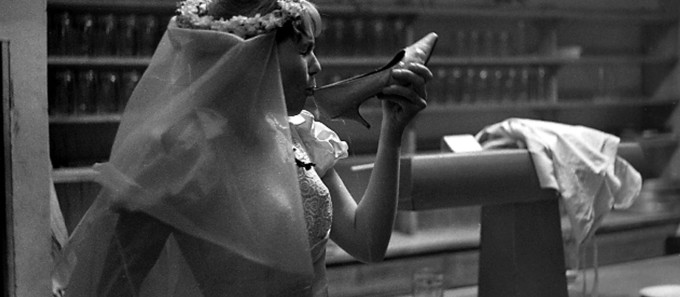- When:
- Friday, April 29, 2016, 4:00pm - 4:00pm
- Description:
-
In celebration of the 50th anniversary of Pearls of the Deep, join us for a roundtable discussion, reception, and film screening. The roundtable begins at 4pm, followed by the reception at 5pm and the film at 6pm. Attendees of the roundtable are guaranteed a seat at the film screening; all other seats are offered on a first-come, first-served basis.
In a turning point for the Czech New Wave, directors including Jiří Menzel, Věra Chytilová, and Jan Němec gathered in 1964 to create the omnibus film Pearls of the Deep (Perličky na dně). Based on stories by writer Bohumil Hrabal—a flashpoint for the artistic experimentation and boundary-pushing that characterized the movement—the episodes range from the surreally chilling to the caustically observant to the casually romantic, but all have a cutting, wily view of the world. Also screening is Ivan Passer’s A Boring Afternoon, created for the omnibus film but not included in the final cut.
Roundtable discussion (4pm): Ivan Passer, Herbert Eagle (University of Michigan), Alice Lovejoy (University of Minnesota), Milos Stehlik (Facets), and Malynne Sternstein (University of Chicago) reflect on the film’s significance on its 50th anniversary and provide historical context for the role the film and its directors played in the Czech New Wave. Further details to be found at ceeres.uchicago.edu.
Pearls of the Deep (Jiří Menzel, Věra Chytilová, Jaromil Jireš, Jan Němec, & Evald Schorm, Czechoslovakia, 1966, 107 min., 35mm)
A Boring Afternoon (Ivan Passer, Czechoslovakia, 1964, 14 min., DCP)
Films courtesy of the Czech National Film Archive.Ivan Passer is a Czech filmmaker who cowrote some of the most celebrated films of the famed Czech New Wave (including Miloš Forman’s Loves of a Blonde and The Firemen's Ball). His major contribution to the movement came in 1965 with his astonishing directorial debut, Intimate Lighting. After the Soviet invasion of Czechoslovakia in 1968, Passer fled to the United States, where he resumed his film career. Among his U.S. films are Born to Win, Law and Disorder, and the critically acclaimed Cutter’s Way. Stalin, which he directed for HBO, won three Golden Globes and four Emmys.
Herbert Eagle is as associate professor of Slavic Languages & Literatures at the University of Michigan. His research and teaching have focused on Russian and East European cinema, film theory, theory of verse, and controversial prose under communism. He published Russian Formalist Film Theory (1981) and, together with Anna Lawton, edited the anthology Words in Revolution: Russian Futurist Manifestoes, 1912-1928 (republished 2006). His work on poetry has been concerned with the way that rhythmic and semantic structure and sound repetition shape meaning in free verse. He has also written on the prose of Mikhail Lermontov, Karel Čapek, Evgenii Zamiatin, Ludvík Vaculík, Milan Kundera, and Alexander Solzhenitsyn.
Alice Lovejoy is a film, media, and cultural historian whose research examines governmental and institutional media cultures in transnational perspective. The author of Army Film and the Avant Garde: Cinema and Experiment in the Czechoslovak Military (2015), she is currently working on two book projects: the first is about postwar children’s television and film institutions, and the second is about World War II London as a space of international media production. She has also worked as a film critic, curator, and filmmaker, including as an editor at Film Comment magazine.
Milos Stehlik is the director of Chicago’s Facets Multi-Media, which he co-founded in 1975. Facets is a cinematheque which presents film premieres, retrospectives and festivals, including the Chicago International Children's Film Festival. Facets is also a major national distributor of over 65,000 art and classic films on DVD. He is a film contributor to Worldview, the international affairs program of WBEZ, and has served on the juries of numerous international film festivals.
- Co-presented by the Center for East European and Russian/Eurasian Studies, the Central Europe Workshop, the Department of Slavic Languages and Literatures, and the Franke Institute.
Pearls of the Deep
Screening and roundtable with Ivan Passer

Pearls of the Deep (Perličky na dně)